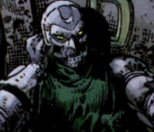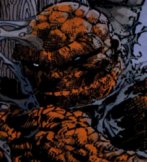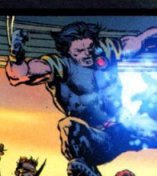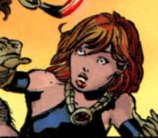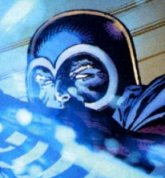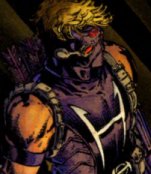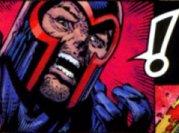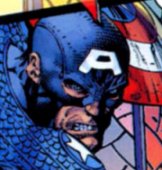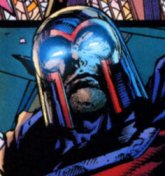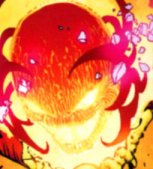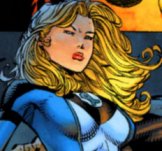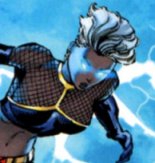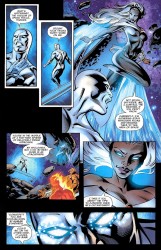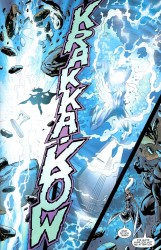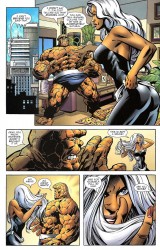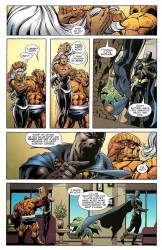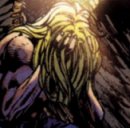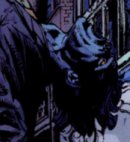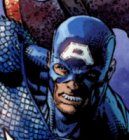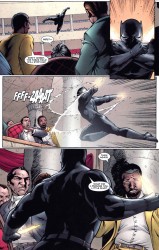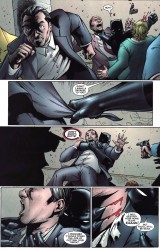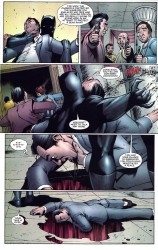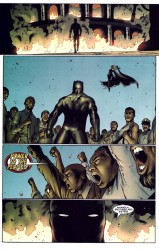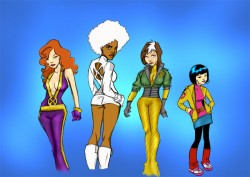Gonna go to Ghana!
Yeah!
And when I get there…
Ohh! I’m gonna dance!
Dance! Dance! Dance!
–Killer Mike, “Gonna Go To Ghana”
I find it’s distressin’, there’s never no in-between
We either niggas or Kings,
We either bitches or Queens
–Mos Def, “Thieves in the Night”
Black is
Black is something to laugh about
Black is something to cry about
Black is serious
Black is a feeling
Black is us, the beautiful people
–Mos Def & Talib Kweli, “Yo Yeah”
I happened upon the idea of a black Trinity entirely by accident. I wrote about Luke Cage for the 4th of July and thought the American Dream/Black Reality connection was pretty swift. Then, I wrote the piece on afro futurisim and New Gods. The ensuing conversation, which has sprawled from real life to email to twitter to IRC to AIM and back around again, has been fascinating.
The FBB4l gang, chief among them Pedro, Chris, and David, helped me think this latest step through. Luke is the American Dream/Black Reality. He’s in the thick of it and grinding to make ends meet and make sure his daughter lives a better life than he did (shades of B.I.G.). Mister Miracle, Shilo Norman, is the Black Fantasy. He’s broken the chains of slavery and oppression, and exists to bring everyone else out of it. He’s Nat Turner, Harriet Tubman, Frederick Douglass, MLK, and Malcolm X all rolled up into one.
Black Panther is the third part of the trinity. He’s the Black Ideal. Some context first, though.
It’s fair to say that Africa is idealized amongst Americans. You can see it in dead prez’s “I’m A African,” in the niggas/kings dichotomy, or even in those dudes who still wear those corny dashikis in public. Egypt, Ethiopia, Ghana, Nigeria, Kenya, and other countries are crazy hyped. I’ve personally known a few blacks who have gone to Africa and come back with some kind of epiphany or new outlook on something. Richard Pryor decided to stop saying “nigger” after he went to Africa.
I plan to visit Africa one day. I lived in Spain during high school, so I could have easily made that trip, but I’m kind of glad that I didn’t. I’m older and hopefully wiser now, so when I finally do it, it’ll mean more. It’s like saving yourself for marriage, but way more expensive and you’re more likely to get stung by a fly and die.
Africa is in a special space for a lot of black people. It’s the Motherland. It’s where we all came from, and kind of like growing up and leaving the house, you can’t go back again. Marcus Garvey‘s (birthday next Sunday!) Back to Africa movement got derailed pretty quickly, and that was probably the most organized push. Beyond that is the much-talked about anti-black sentiment on the part of some Africans (“Some Africans don’t like us no way,” Nas) and the reality of how much it costs to visit Africa, not to mention relocation.
(Marcus Garvey looks kinda like Beanie Sigel.)
Even still, Africa is the Motherland. It’s as black as a raised right fist, red and black and green flags, drums, and dancing. You can trace the drums in hip-hop back to the drums of Africa and ciphers to villages. We’ve adopted names, terms, and various rituals into our cultural identity. We’ve even faked it up some with Kwanzaa. I personally don’t like the term, but a lot of people have adopted African-American at least in part because it’s a connection to Africa.
It was something that was common growing up. “In Africa, we weren’t slaves. We were kings and queens. We were equal. We were free.” Putting aside the idea of everyone ever being kings and queens, it’s a great sentiment. It’s another way to build up an identity.
In a curious bit of luck and serendipity, Stan Lee and Jack Kirby, two old Jewish guys, created the logical endpoint of this idealization of Africa in the Black Panther. The character was ushered further in that state by Don McGregor, Christopher Priest, and Reggie Hudlin, amongst others.
There’s a few good reasons as to why this is so. He’s from a country that’s both technologically advanced and successfully avoided colonization. He’s the king of that country. And he married a Strong Black Woman(tm) and made her the queen of that country. Let’s go through in order.
Wakanda is both isolated and technologically advanced. The important part is that both of these are by choice. They are self-reliant. They didn’t need anyone to bring knowledge to them, because they are a nation of intelligent black people. Panther is smart, to be sure, but he is reaping the benefits of those who came before him. He is standing on the shoulders of giants. He’s learning from the past, in as literal a way as possible. Panther didn’t get to where he is all by himself. His family helped him along that path. He’s part of a legacy.
Wakanda has never been conquered. The clearest way I had this put to me was that “Europe was the worst thing to happen to Africa.” Without that, you’ve got no colonization, or what’s generally thought of when you say ‘colonization,’ at least. You’ve got a nation of black people who stood up against the man and didn’t buckle. They did a lot more than not buckle– they killed kind of a lot of people in the process. Their behavior was kind of like a snake. If you don’t mess with it, it won’t mess with you. “Don’t start none, won’t be none,” to be glib.
Never been conquered. That’s a big deal. That’s the guy who brags about being undefeated, never been knocked out, and can take on all comers. It’s Muhammad Ali in the form of a country. First minute, first round. Hudlin showed this in his first arc. Jason Aaron showed this to great effect in his first issue of Panther’s Secret Invasion tie-in.
When they’re going up against humans, they’re unstoppable. Your guns won’t even work. Don’t even bother. Against super advanced space aliens who planned ahead? They’re going to break down their high technology and reduce the fight to sticks and spears.
Plus, they’ve already got Skrull heads on pikes. “Abandon all hope, ye who enter here.”
Panther being the king of Wakanda is kind of the easy one, with Storm being his wife a close second. Everyone wants to be the top dog, right? T’Challa being number one counts for a lot here. It’s a sign of not being downtrodden, being beholden to no one, and being able to chart the course of your own destiny.
The Storm and Panther marriage, regardless of your opinion on its execution, fixed that. It simultaneously fixed the problem of the most popular black character in comics ignoring basically every aspect and other member of her race and created a fertile new storytelling ground by instantly turning Wakanda into a superpower.
My favorite part of it, though, is the racial aspect. T’Challa and Ororo have become the king and queen that so many black couples want to be. They run one of the most powerful nations in the world. Wakanda is suddenly interesting again. They have land, a family, and will eventually have a dynasty.
They’re doing all of this free of oppression of any kind. Their royal status means that no authority on earth can lock them down them. No one can touch them. They’re finally at the point where they are free to live life as they wish.
Their relationship forces both of them to elevate their game. T’Challa is used to a) always being right, b) always getting his own way, and c) not being questioned. Now that Storm is there, he’s got somebody who’s going to put him in check vigorously and often. Now that Storm has T’Challa, she can open up and drop that snooty ice queen act she’s been using. She doesn’t have to be aloof and cold any more. Two strong personalities being thrown into the mix forces change.
A couple further points. A big part of Luke Cage’s character is providing for his daughter, and therefore the future. In a similar move, T’Challa has his younger sister Shuri to worry about. He comforts her when she kills her first man, gives her support when she needs it, and trusts her skill. In the future, she’s the Black Panther, so they both must have done something right between now and then. T’Challa keeps an eye on the future, and part of that is being willing to put on someone else and step down.
Panther is confident, powerful, intelligent, and free. That sounds like the Black Ideal to me, yeah?
That’s the Black Trinity there. Reality, Fantasy, and Ideal. That’s a misnomer, though. The word Trinity implies that it’s the full range of experiences, when that is kind of clearly not true. Cheryl Lynn has some interesting ideas on what the female part of the Black Experience involves, including specific takes on Storm and Misty Knight. We’ll see those one day, I’m sure.


